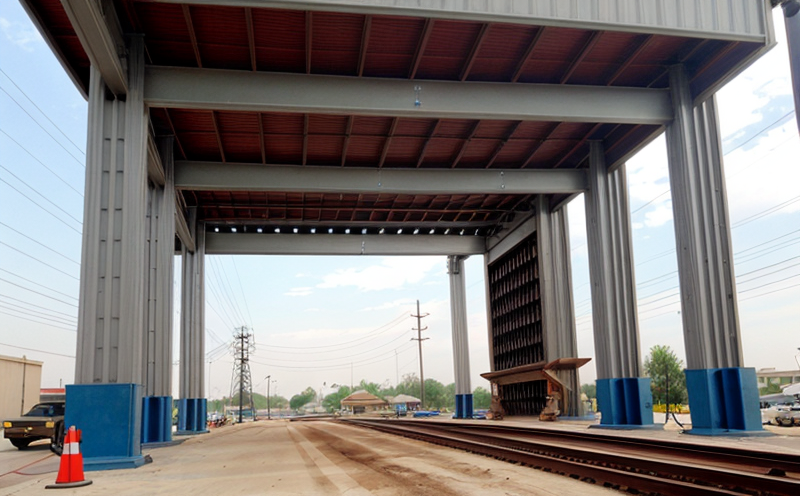EN 6031 Tensile Testing of Aerospace Metallic Materials
The EN 6031 standard is a critical part of the European aviation industry's quality control framework. This test method evaluates the tensile strength and elongation properties of metallic materials used in aircraft structures, engines, and other components. Compliance with this standard ensures that aerospace parts meet stringent safety requirements.
The EN 6031 testing process involves subjecting a metal specimen to uniaxial tension until it fractures. The test measures the tensile strength (yield strength and ultimate tensile strength) and elongation at fracture, which are key indicators of material integrity and reliability in aerospace applications.
The specimens used for this test can be of various shapes such as dogbone or round bar, depending on the part being tested. Specimen preparation is crucial to ensure accurate results. This includes cleaning the specimen surface to remove any contaminants that could affect the test outcome. The cleanliness and smoothness of the sample are critical factors in achieving reliable tensile properties.
The testing equipment required for EN 6031 compliance typically includes a universal testing machine capable of applying precise load measurements with high accuracy. Additionally, extensometers may be used to measure specimen elongation accurately during the test. The environmental conditions must also meet specific requirements, such as temperature control and humidity levels.
The standard specifies detailed acceptance criteria for tensile strength and elongation values. Compliance officers and quality managers rely on these stringent standards to ensure that materials used in aerospace products can withstand the stresses they will encounter during operation without failure. This ensures not only the safety of passengers but also the reliability of aircraft systems.
The test results provide critical data for material selection, process validation, and quality assurance. Engineers use this information to optimize manufacturing processes and improve product design. The testing is a key step in ensuring that materials meet the demanding specifications set by aerospace regulatory bodies such as EASA (European Aviation Safety Agency).
Scope and Methodology
The EN 6031 standard defines the protocol for tensile testing of metallic materials used in aircraft structures, engines, and other components. The scope includes both laboratory testing and quality assurance checks during production processes.
- Test Specimens: Dogbone or round bar specimens are prepared from the specific material to be tested.
- Testing Equipment: A universal testing machine with a load cell capable of measuring up to 10kN is used. Extensometers may also be employed for precise elongation measurements.
- Environmental Conditions: Tests are conducted under controlled conditions, typically at room temperature and standard humidity levels.
The methodology involves applying a controlled rate of loading to the specimen until it fractures. The load-displacement curve is recorded throughout the test. This curve provides essential data on tensile strength (yield strength and ultimate tensile strength) and elongation at fracture.
After testing, specimens are examined for any surface or internal defects that could affect their mechanical properties. Compliance with EN 6031 requires that all test results fall within specified acceptance criteria. These include minimum yield strengths and maximum elongations, which vary based on the material type being tested.
The results of these tests provide critical data for quality assurance purposes. They help ensure that materials used in aerospace products meet the stringent safety requirements set by regulatory bodies like EASA. This not only enhances product reliability but also contributes to passenger safety and operational efficiency.
Eurolab Advantages
At Eurolab, we offer comprehensive EN 6031 tensile testing services tailored to the unique requirements of the aerospace industry. Our state-of-the-art facilities and experienced team ensure that you receive accurate, reliable test results.
- Comprehensive Testing Capabilities: We provide a full range of mechanical tests including tensile, bend, impact testing, and more.
- Accurate Equipment: Our testing machines are calibrated to international standards and regularly maintained by certified technicians.
- Experienced Staff: Our team comprises engineers with extensive experience in aerospace materials testing.
- Certified Results: All test results comply with the latest European aviation safety regulations, providing you with confidence that your products meet all required standards.
We pride ourselves on delivering high-quality service and support to help our clients achieve their testing goals. Whether you need routine quality assurance checks or specialized tests for new materials, Eurolab is here to assist you every step of the way.
Use Cases and Application Examples
- Aircraft Structures: Testing metallic alloys used in wings, fuselage, and landing gear ensures they can withstand the stresses of flight without failure.
- Engine Components: Materials like titanium and nickel-based superalloys are tested to ensure they meet the high-stress requirements of jet engine components.
- Landing Gear Systems: Compliance with EN 6031 helps guarantee that landing gear can handle the impact forces experienced during takeoff and landing.
- Fasteners: Testing fastener materials ensures they have sufficient strength to maintain structural integrity under operational conditions.
In each of these cases, compliance with EN 6031 is essential for ensuring the safety and reliability of aerospace components. By adhering to this standard, manufacturers can demonstrate their commitment to quality and regulatory compliance.





